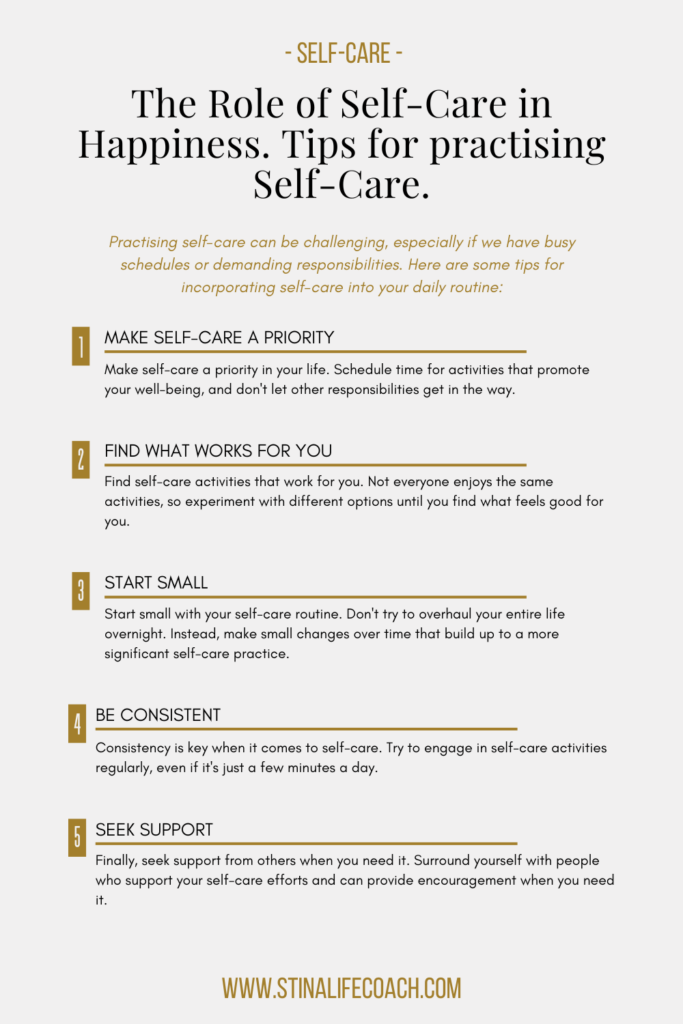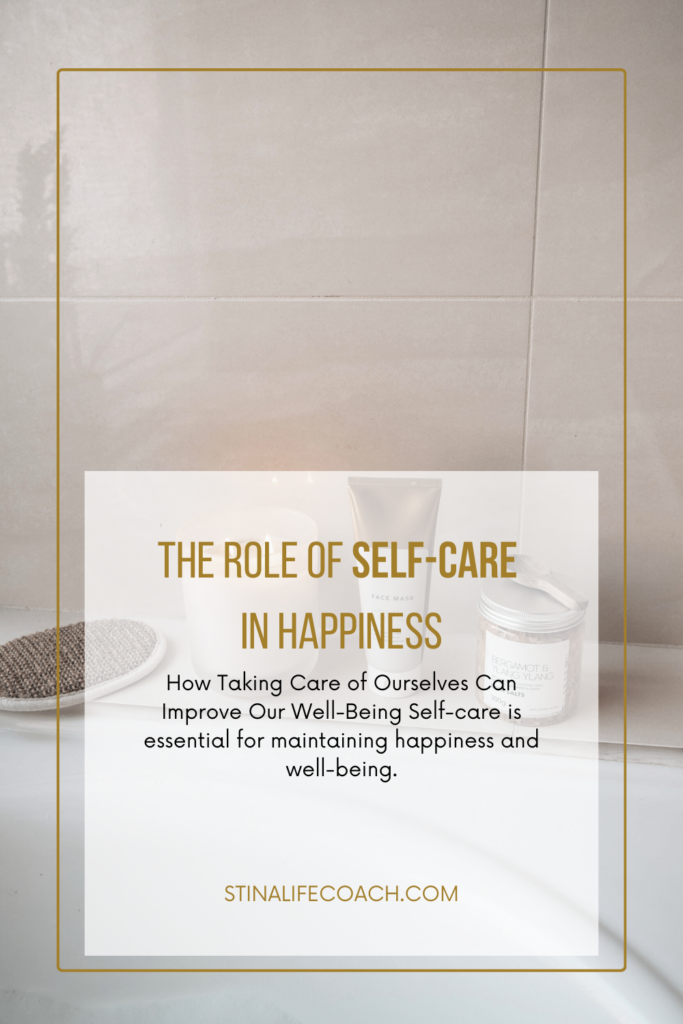The Role of Self-Care in Happiness: How Taking Care of Ourselves Can Improve Our Well-Being Self-care is essential for maintaining happiness and well-being.
Self-care has become a buzzword in recent years, but it’s more than just a trend. It’s a necessary practice for maintaining happiness, well-being, and overall health. Self-care refers to the actions we take to care for ourselves physically, mentally, and emotionally. It includes everything from getting enough sleep to practising mindfulness to indulging in our favourite hobbies. In this blog post, we’ll explore the role of self-care in happiness and how taking care of ourselves can improve our well-being.

What is Self-Care?
Self-care involves any activity that we do deliberately to take care of our physical, mental, and emotional health. It includes activities like exercise, getting enough sleep, eating a healthy diet, meditating, practicing yoga, spending time in nature, and pursuing hobbies or interests that we enjoy.
Self-care is not selfish or indulgent. It is necessary for our overall well-being and allows us to function at our best. When we take care of ourselves, we are better equipped to handle the challenges that life throws our way.

RELATED: 20 HEALTHY WAYS TO PRACTICE SELF-CARE AND SELF-LOVE
The Benefits of Self-Care
Self-care has numerous benefits for our physical, emotional, and mental health. Here are some of the ways that self-care can improve our well-being and increase our happiness:
1 Reduces Stress and Anxiety
Taking care of ourselves can help to reduce stress and anxiety. When we engage in activities that promote relaxation, such as meditation or yoga, we can lower our stress levels and improve our overall sense of well-being.
2 Improves Physical Health
Self-care can also improve our physical health. Eating a healthy diet, getting enough sleep, and exercising regularly can all help to reduce the risk of chronic diseases like diabetes, heart disease, and obesity.
3 Boosts Mood
Taking care of ourselves can also improve our mood. When we engage in activities that we enjoy, such as spending time with friends, pursuing a hobby, or listening to music, we release feel-good chemicals in our brains like dopamine and serotonin. These chemicals can boost our mood and increase feelings of happiness.
4 Increases Productivity
Self-care can also increase our productivity. When we take care of ourselves, we are more focused, energized, and motivated. This can lead to increased productivity and better performance in our work or other activities.
5 Improves Relationships
Finally, self-care can also improve our relationships. When we take care of ourselves, we are better equipped to handle the demands of our relationships. We are more patient, compassionate, and understanding, which can lead to stronger, more fulfilling connections with others.

RELATED: 8 HARD TRUTHS ABOUT SELF-CARE
Tips for Practicing Self-Care
Practicing self-care can be challenging, especially if we have busy schedules or demanding responsibilities. Here are some tips for incorporating self-care into your daily routine:
Make Self-Care a Priority
Make self-care a priority in your life. Schedule time for activities that promote your well-being, and don’t let other responsibilities get in the way.
Find What Works for You
Find self-care activities that work for you. Not everyone enjoys the same activities, so experiment with different options until you find what feels good for you.
Start Small
Start small with your self-care routine. Don’t try to overhaul your entire life overnight. Instead, make small changes over time that build up to a more significant self-care practice.
Be Consistent
Consistency is key when it comes to self-care. Try to engage in self-care activities regularly, even if it’s just a few minutes a day.
Seek Support
Finally, seek support from others when you need it. Surround yourself with people who support your self-care efforts and can provide encouragement when you need it.

RELATED: 20 SELF-CARE SUNDAY IDEAS TO REST AND RECHARGE

Self-care is an important aspect of maintaining happiness and well-being.
In conclusion, self-care is an important aspect of maintaining happiness and well-being. It involves taking care of ourselves physically, emotionally, and mentally through activities like exercise, getting enough sleep, eating a healthy diet, meditating, and pursuing hobbies or interests that we enjoy. When we prioritize self-care, we can reduce stress and anxiety, improve our physical health, boost our mood, increase productivity, and improve our relationships with others.
Making self-care a priority in our lives can be challenging, but it is worth the effort. By finding self-care activities that work for us, starting small, being consistent, and seeking support when we need it, we can create a self-care routine that promotes our well-being and happiness.
In a world where we often put the needs of others before our own, it’s important to remember that self-care is not selfish or indulgent. It’s a necessary part of living a healthy, fulfilling life. So, take some time today to prioritize your self-care and see the positive impact it can have on your overall well-being.





